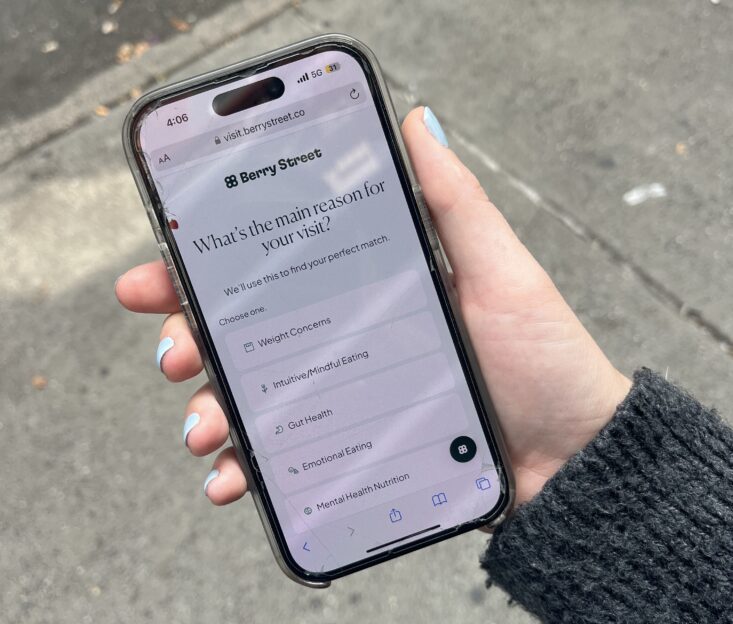If you’re like me, you’ve been battling a familiar nemesis: the same 15 pounds that never seemed to budge. I’ve been so overwhelmed by the sheer number of diet/fitness options—there are so many to choose from!
Desperate for a change, I narrowed my search to two promising, well-regarded services: Berry Street and Noom.
If you aren’t super familiar with them, here’s both at a glance: Noom is a digital app that focuses on educating users on nutrition to achieve weight loss while Berry Street promotes weight loss by connecting patients with registered dietitians for 1-on-1, personalized nutrition therapy.
Both touted compelling approaches to weight management, but my journey led me to prefer one over the other. Here’s my take on how they stack up against each other, based on personal experiences and a whole lot of research:
Ease of Access to Professional Guidance

Berry Street: Access to a dietitian has never been simpler. Signing up took less than two minutes, and I was immediately matched with a specialist tailored to my specific nutritional needs.
Noom: Noom’s subscription setup is based on an easy-to-use mobile app focusing on behavioral changes through daily tasks and lessons. They also provide access to helpful health coaches who aren’t necessarily registered dietitians. While this support is valuable, it didn’t feel as personalized or medically grounded as Berry Street’s.
Winner: Berry Street for its seamless and personalized accessible setup.
Cost of Services
Berry Street: Berry Street is covered by a variety of insurance companies, meaning that your out-of-pocket expense can be as little as $0. This was the case for me, and I appreciated being able to work towards a healthier lifestyle without breaking the bank. If Berry Street isn’t covered by your insurance plan, they give you a personalized estimate of your out-of-pocket costs.
Noom: Noom, however, is not covered by insurance. Costs vary depending on your subscription plan – with monthly renewals up to $70 and yearly renewals over $200. Though this may fit some people’s budget, this is a bit on the pricier side for me.
Winner: Berry Street for its $0 out-of-pocket cost when covered by insurance.
Flexibility and Convenience

Berry Street: All appointments are virtual, easily fitting into my hectic schedule. Whether I had a quick question or needed a full session, I could manage it all from the comfort of my home.
Noom: Noom offers great flexibility with its mobile app, allowing me to track meals and exercise anytime, anywhere. However, the lack of real-time interaction with a specialist made it less accommodating when I needed immediate advice.
Winner: Tie. Berry Street excels in professional availability, while Noom shines in self-managed convenience.
Specialization in Dietary Needs
Berry Street: Dietary needs are as unique as fingerprints, so there’s no one-size-fits-all approach. That’s why I was drawn to Berry Street’s bespoke approach. With specialists in over 200 areas, you’re guaranteed to be matched with someone who understands your specific health concerns, including diabetes, IBS, or post-natal nutrition. (My particular Achilles Heel? Emotional eating.)
Noom: Noom's psychological approach is broadly effective but lacks the deep specialization Berry Street offers. It focuses more on calorie tracking and behavioral changes, which works well for general weight loss but might fall short for specific health conditions.
Winner: Berry Street. The depth of evidence-based, specialized care available through Berry Street simply wasn’t matched by Noom.
Range of Services
Berry Street: If an exclusive focus on dietary management is what you’re looking for, Berry Street is fantastic. However, it could feel limited if you're looking for a broader lifestyle overhaul. Though some dieticians may take a more holistic approach, it varies depending on the individual provider.
Noom: Weight gain isn’t always just about diet; learning your triggers is definitely a worthwhile endeavor. I appreciated Noom for encouraging a more holistic approach to lifestyle changes, including stress management and exercise.
Winner: Noom, for reminding me that meditation and walking are important parts of my wellness goals.
Success in Sustainability

Berry Street: When it comes to maintaining weight loss, I’ve found that a support system and ongoing guidance are key. Berry Street provides continuous access to dietitians who can adjust your plan as your needs evolve.
Noom: Noom’s approach is educational, aiming to equip you with tools to be independent, but transitioning from intensive app guidance to solo maintenance felt daunting.
Winner: Berry Street, for offering sustained, adaptable support.
Final Verdict: Berry Street Takes the Cake!
Choosing a weight management solution is deeply personal. When it comes to the battle between Berry Street and Noom, it really depends on what aspects of weight management you prioritize.
I love Berry Street’s deep bench of real healthcare professionals and specialized care. It’s like having a dietitian on speed dial, with the added bonus of insurance coverage. Noom is fantastic for its engaging platform and self-managed psychological approach. However, for my journey, the personalized touch of Berry Street helped tip the scales in their favor—literally.
We've all been there—standing at the crossroads of Inaction and Change. If you're ready to take that first step towards weight loss, Berry Street is definitely worth considering. After all, the best path to wellness is the one that is specifically made for you.



